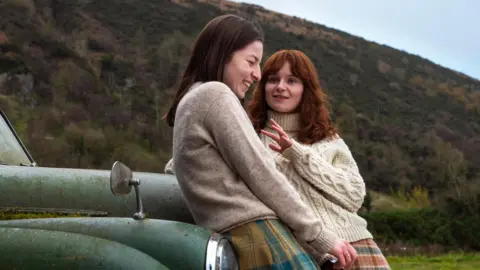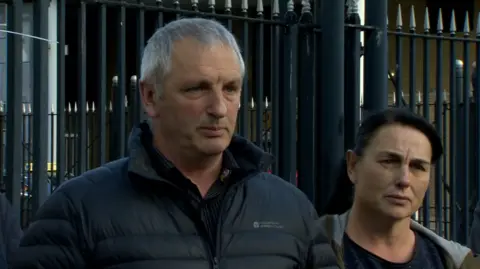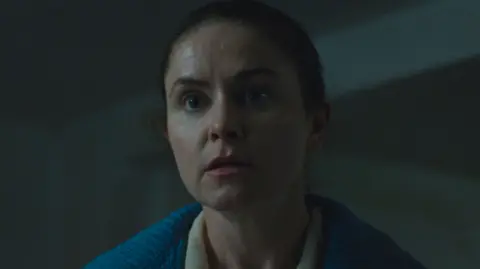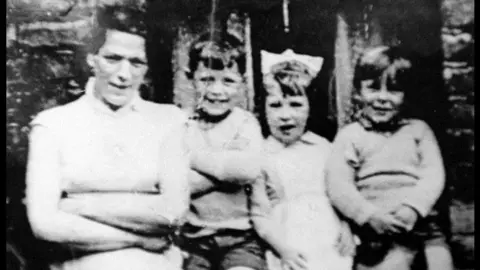Michael McConville has said that the portrayal of his mother's murder and secret burial by the IRA in a new Disney drama is "horrendous" and "cruel".
Say Nothing, which is based on a book by Patrick Radden Keefe of the same title, tells the stories of several people living in Northern Ireland during the Troubles.
Among the stories featured in the series, is that of Jean McConville, who was among those "disappeared" by the IRA during the conflict.
Her son, Michael McConville, has said the programme is "another telling of [my mother's story] that I and my family have to endure".
BBC News NI has approached Disney for comment.
'Not entertainment for my family'
Say Nothing is a nine-part drama produced by FX and showing on Disney+ in the UK.
It depicts a period of conflict in Northern Ireland during the late 20th century known as the Troubles, which lasted almost 30 years and cost the lives of more than 3,500 people.
The series stars Lola Petticrew as Dolours Price and Hazel Doupe as Marian Price, young sisters who were prominent members of the IRA [Irish Republican Army].
The series also features Anthony Boyle as Brendan Hughes, another IRA member, and Josh Finan as Gerry Adams.
It has received positive reviews from critics.
 Rob Youngson/FX
Rob Youngson/FXThe story told in the drama is in part based on a series of interviews conducted with Dolours Price and Brendan Hughes years after the events.
The recordings were made on behalf of the US university, Boston College, as part of an academic project to create an "oral history" of the Troubles.
But the project was highly controversial and police in Northern Ireland later gained access to the tapes for use as evidence in ongoing murder inquiries.
During these interviews Mr Hughes alleged that Gerry Adams was involved in Jean McConville's abduction and murder. The former Sinn Féin leader has said this is a lie.
Adams has also consistently denied being a member of the IRA.
Adams was arrested in 2014 over the murder of Mrs McConville but was never charged.

In a statement released on Wednesday evening, Mr McConville said: "I have not watched it nor do I intend watching it.
"I have no interest in it."
He added that "Disney is reknowned for entertainment", but said that his mother's death "is not entertainment for me and my family".
"This is our reality, every day for 52 years."
Mr McConville also criticised the timing of the series for proximity to the anniversary to his mother's death on 1 December.
"The portrayal of the execution and secret burial of my mother is horrendous and unless you have lived through it, you will never understand just how cruel it is," he said.
"Everyone knows the story of Jean McConville: even Hillary Clinton who I met a few years ago knew my mother’s story.
"And yet here is another telling of it that I and my family have to endure."
Mr McConville said that while those who had created the series would "move on," he cannot.
'A number of meetings'
Say Nothing author Patrick Radden Keefe told BBC News NI that he had "a number of meetings" through the Wave Trauma Centre in Belfast with the McConvilles and representatives from some of the families.
These meetings were to "talk about what we were doing, what our intentions were and be there to answer any questions or to hear any concerns", he said.
Mr Keefe added: "I did some outreach to Helen McConville, now Helen McKendry, and her husband Seamus.
"I had a long Zoom conversation with them in which we talked about what it was we were doing. I was there, they knew where to find me if they had questions or concerns.
 Rob Youngson/FX
Rob Youngson/FX"We wanted to make it clear that we were going to approach this story with a great deal of sensitivity and compassion."
Mr Keefe added that he wanted to "do justice to these traumatic and terrible events".
He said it is a different way to tell the story of The Troubles, "a human story through the perspective of the lives of these two very different women, one of them a victim and one of them a perpetrator".
What happened to Jean McConville?
 PA Media
PA MediaThe mother-of-10, a Protestant, was originally from east Belfast and converted to Catholicism after marrying Arthur McConville.
After being intimidated out of east Belfast, the family moved to west Belfast and set up home in the Divis flats on the Falls Road.
Not long after the move in 1971, Arthur McConville died from cancer.
She was taken from her home by the IRA in December 1972.
There had been speculation that she was taken after being seen by neighbours helping an injured British soldier.
Others claimed she was an informer, but this was dismissed after an official investigation by the Northern Ireland Police Ombudsman.
Those known as the Disappeared had been abducted, murdered and secretly buried by republicans.
The IRA admitted in 1999 that it murdered nine of the Disappeared - including Jean McConville - and buried them at secret locations.
It was several years later, in 2003, that her body was finally found on Shelling Hill Beach in County Louth in the Republic of Ireland.
Irish police confirmed that she had died from a bullet wound to the head.
In the days that followed, the IRA issued a statement apologising for the grief it had caused the families of the Disappeared and that their suffering had continued for so long.


Post a Comment